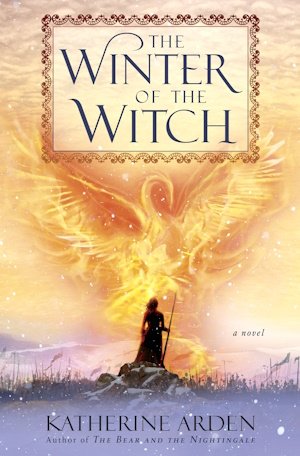The frost-demon bent again to the woman, breathing more words into her ear.
A sudden movement drew Vasya’s eye. Another man was watching the pair from the other side of the fire-pit. His embroidery and his ornaments indicated rank; his eyes were great and dark with pain.
The sudden movement had been the involuntary dart of his hand to his sword-hilt. As Vasya watched, he let it go again, finger by finger.
Vasya did not know what to make of it.
Her feet carried her nearer the winter-king and the tawny woman beside him. She supposed that she was meant to drop her eyes, fill the cups, and scurry away. But instead she walked forward without affectation, her eyes on the eyes of the frost-demon.
He glanced up, and then, looking amused, watched her come forward.
At the last second, Vasya lowered her gaze and tipped her skin to fill the cups.
A thin, cold, familiar hand closed on her wrist. Vasya jerked back, splashing mead over them all.
Yelena managed to turn, keeping the wine from her gown. Then she recognized Vasya. “Go back,” she said to Vasya. “It is not your task to serve us, girl.” It seemed to Vasya that she was conveying a warning behind the words: Morozko, proud, young, death in his long hands, was dangerous.
He had not tried to retain her wrist when she jerked away from him. She was sure now that he did not know her. Whatever bond they’d shared—hunger, reluctant passion—that was gone.
“Forgive me,” Vasya said to the woman. “I only wished to repay your hospitality.”
Her eyes did not leave the eyes of the frost-demon. His glance, without hurry and without admiration, traced her cropped hair, her thin face, her body. She felt her color rise.
“I do not know you,” Morozko said.
“I know that you don’t,” said Vasya. Yelena stiffened, either at Vasya’s words or the tone of them. Morozko glanced at Vasya’s arm.
She looked too, saw the skin marked white where he’d touched her.
“Have you come to ask a favor of me?” he asked.
“Do you mean to grant me one?” asked Vasya.
Yelena said sharply, “Little fool, go away.”
Still no flicker of recognition in the frost-demon’s eyes, but he put out a single finger and touched the inner part of her wrist. Vasya felt her heartbeat quicken under his fingers, though only a little. The tread of her heart had looked upon life and death and things in between without yet faltering.
Morozko’s glance was quite cold. “Ask,” he said.
“Come away with me,” said Vasya. “My people have need of you.”
Horror, shock, on Yelena’s face.
He only laughed. “My people are here.”
“Yes,” she said. “And elsewhere too. You have forgotten.”
The cold fingers released her abruptly. “I forget nothing.”
Vasya said, “If I am lying, winter-king, then why would I risk my life to come before you in this hall at Midwinter?”
“Why are you not afraid of me?” He did not try to touch her again, but an icy wind stirred the hall, blueing the firelight and dampening the talk.
Yelena wrapped her arms about herself; a hush rippled through the raucous crowd. Vasya almost laughed. Was that supposed to make her afraid? Blue fire? After everything else?
“I am not afraid to die,” she said. She wasn’t. She had walked down that road. There was nothing in its cold stillness, the great sweep of stars, that could frighten her. Suffering was for the living. “Why should I fear you?”
His eyes narrowed. Vasya realized what a stillness had gathered about the fire, like the birds when a hawk comes soaring. “Why indeed?” Morozko said, holding her gaze. “Fools are often brave, for they do not understand. Leave us, girl, as your mistress bids. I will honor your courage, and forget your foolishness.” He turned away.
Yelena sagged; she looked caught between disappointment and relief.
Not knowing what to do, Vasya slipped back into the crowd, her hand sticky with mead, her wrist tingling where his hand had lingered. How could she make him remember?
“Did she displease you, lord?” Vasya heard Yelena ask, with curiosity and censure mingled.
“No,” said the frost-demon. She could feel him watching her go.
“But I have never met anyone who was not afraid.”
The people drew away from Vasya when she came among them, as though she were stricken with some sickness. The old serving-woman hustled up behind her, seized her elbow, relieved her of the wineskin and growled in her ear, “Mad thing, what possessed you to approach the winter-king so? It is the lady who gives him mead. She takes his gaze upon herself; that is her task. Do you not know what happens to girls that catch his eye?”
Vasya, feeling suddenly cold, asked, “What happens?”
“He might have chosen you, you know,” muttered the woman just as Yelena rose to her feet. She was pale, but composed.
A deadly hush fell.
The blood began to beat in Vasya’s ears. In the fairy tale, a father took his daughters into the forest and left them there, first one, then the other: brides of the king of winter. The winter-king sent one home with her dowry.

























